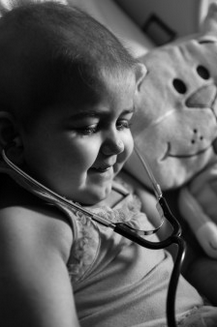What to Say to Someone with Cancer
It’s hard to know what to say to someone with cancer. If you’re like most, you blurt an instinctive, “I’m sorry.” Albeit well-intentioned, “I’m sorry” is a sorry substitute for a meaningful connection during a vulnerable time.

Sky Khan knows how to react when receiving bad news. She became an involuntary, repeated “bad news teller” after doctors diagnosed her 4-year-old daughter, Kiki, with leukemia last September.
After hours of face-to-face conversations and challenging phone calls, Sky heard and saw reactions across a spectrum of appropriateness. These firsthand experiences motivated her to reflect on what to say to someone with cancer or facing any sort of life challenge.
Sky compiled her insights into this list to help others. You can read more about Sky, Kiki, and their family by visiting Kiki’s Leukemia Battle Fund.
10 Amazing Reactions to Bad News: The Right Way to Respond to a Friend’s Hardship
Here’s a list of the top 10 things my friends said or did that provided comfort, reassurance, and warmed me to the core. The next time you find yourself reacting to someone’s bad news, have a few responses from this list ready to go and you won’t be left stumbling for the right thing to say or do.
1. Thank you so much for telling me.
A simple thank you was one of the most surprisingly sweet reactions that I received. When a friend felt that it was a privilege to receive my news, it meant so much. Thank you, along with an attentive, calm presence, provided a very comforting result. Sometimes all that’s required in a difficult situation is being a witness to someone else’s anxiety or sorrow. If you only have a few words to offer, saying thank you is a nice alternative to the overdone, ‘I’m sorry’.
2. This really puts things in perspective.
When I was able to provide a friend with the opportunity to reflect on his own health and well-being, it brought optimism to the conversation. It also allowed space to take the focus off of my daughter’s situation, which was often a welcome relief. When a friend was able to express both compassion and a sense of gratitude, the conversation turned hopeful. It is not always easy to appreciate good health while you have it.
3. I’m coming over once a week with a home-cooked meal.
During life’s difficult moments, the importance of food is often overlooked. Not only is it very hard to find the time or energy to eat, cooking is usually the very last thing to receive attention. When a friend committed to delivering a weekly meal along with his company, it became a true lifeline for our family.
4. I’m organizing a meal drop off this month with a group of friends.
When another good friend asked if she could organize our common friends to drop off home-cooked meals every Tuesday and Thursday for a month, I agreed. Sharing the cooking as a group fostered a sense of community and my family felt so uplifted by our friend’s goodwill. Because our daughter’s chemotherapy treatment spanned a long period of time, friends let us decide if the meal plan was still helpful at the end of every month.
Over time, other friends experienced their own roadblocks and among our group, the tradition of a cooking tree has served us well. I’ve now been on both the giving and receiving side of meal delivery and cannot believe how touching the practice is.
5. I am coming to visit.
There is nothing like the physical presence of a good friend amidst a crisis. When a good friend can be a witness, hold your hand, dry tears, ask how you are feeling in this moment, all of this helps on the journey towards healing. When an offer to visit at the hospital or at home came up, I never turned it down. It was especially helpful if friends offered a specific window of availability such as two hours in the afternoon on Saturday or Sunday. The more specific the better.
6. I’ve located a support group that might be helpful.
There are many online listservs, hangouts, communities and support groups that focus on a variety of topics. Often in the midst of tragedy, there is little time to reflect on or locate helpful resources. This can lead to feelings of being overwhelmed or isolated. Connecting with others that are going through the same thing often provides insight and relief from suffering.
One friend located and suggested I join a cancer support group on Facebook that focused on the very specific kind of childhood cancer my daughter had been diagnosed with and while I initially hesitated because I thought it would clog up my feed, I now find the updates informative and it has also led to new friendships and a sense of shared humanity.
7. I will help with fundraising.
Illness, death and other tragedies often incur unanticipated expenses. When a friend offered to help set up a fundraising site for my daughter, and another spread the word about it, the tender messages and generous donations that came in through the site moved us tremendously and were so practical in helping us face the mounting expenses of travel and medical bills. There are now so many wonderful websites that enable point-and-click fundraising for a loved one in need.
8. You are constantly in my thoughts.
When a friend offers positive, healing thoughts, it is a caring, supportive act that can transcend spiritual affiliation. I’ve had friends put my daughter’s name on Tibetan prayer wheels, lift our family up through Christian prayer groups, speak of her health in both Jewish and Muslim religious ceremonies, and even send Reiki distant energy healing. I’ve always welcomed all good-intentioned, positive thoughts.
At my lowest points, whenever I received a spontaneous text or email that informed me we were in a friend’s thoughts at that very moment, it was incredibly moving.
9. Is there an opportunity to celebrate?
There may be an opportunity, when some time has passed and bad news is not so fresh, to recall a positive memory or mark an occasion related to the situation. I received a small handmade book of photo memories from birth through year four on the occasion of my daughter’s 4th birthday. Receiving this thoughtful collection of photos amidst her health crisis, reminded us of happy times. In addition to her birthday, we also managed to mark Halloween by celebrating ancestors that passed before us and Thanksgiving by incorporating a daily recording of what we were grateful for during the month of November.
While I did not feel as celebratory or festive during these events as in past years, going through the familiar motions and traditions encouraged hopefulness within that we would get through this.
10. You are amazing. You are so strong. You will get through this.
A positive affirmation is often the most straightforward way to offer support. Don’t hesitate to remind your friend how resilient she is. Frequently repeat a sentiment that you sincerely believe and soon your friend will also believe those words. Remind her that while it may be a difficult year ahead, she will get through it because she is strong. She is amazing. And she will be even stronger after persevering through the experience.
When responding to bad news, do not put the onus on the person enduring the hardship to tell you what you can do to help. These recommendations are all examples of effective words and actionable items that will allow you to contribute. Try one of these ten recommendations the next time someone needs you to be there in a meaningful way.
Sky Khan is a founding member of the New York Zen Center for Contemplative Care and an active presence at the Haven Hospice in New York City’s Bellevue Hospital where she provides compassionate care for the terminally ill and dying. She is the founder of Generous.nyc and a speaker, author and educator on the topic of generosity. She is also an advisor to cancerversary.nyc, zenyc.org and grief.nyc.
PLEASE VISIT Kiki’s Leukemia Battle Fund.


This is such an important topic. My husband had pancreatic cancer and telling people was never easy. Telling people I’m a widow is still awkward. I also witnessed a spectrum of reactions and this is a great list. I think the concrete offers of help are so wonderfully kind.
Well-meaning, loving people would often say “Let me know if there is anything I can do” and it put the pressure on me to ask and think of something I needed help with when I couldn’t think of what I needed or wanted,
“You’re so strong” was hard for me to take sometimes, but I think it should still be here on the list. I didn’t want to be strong, I wanted my husband to be healthy. But, hearing it over time, made me believe it and know that I was strong and could survive.
Thank you for sharing and I hope this list helps those struggling to cope with the bad news of a loved one.
LikeLiked by 2 people
Great lessons for us all.
LikeLike
Reblogged this on Journey Taker and commented:
Lovely things to do when someone in your life is suffering.
LikeLike
Bloody great post
LikeLike
Well written on a very important subject. Thank you for the follow.
LikeLike
May I reblog this on diabetesdietblog.com? It is a difficult area and advice from someone who knows would help others.
LikeLiked by 1 person
Absolutely! 🙂
LikeLiked by 1 person
Thank you!
LikeLike
It will appear in April. Thank you very much. It is such a helpful post.
LikeLike
Reblogged this on Kindness Blog.
LikeLike
Thank you. Great piece!!
LikeLiked by 1 person
Wonderful advice.
LikeLike